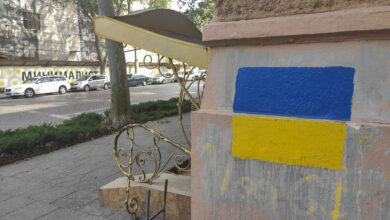Morocco marks 80 years since Operation Torch

By Fatima Zohra Bouaziz
Casablanca, Morocco, Nov 8 (EFE).- Eighty years ago, 202 United States ships managed to sneak across the Atlantic Ocean to Morocco’s Casablanca without being spotted by Nazi forces, marking the start of Operation Torch, an assault that kicked the Germans out of North African front during World War II.
Around 33,000 US soldiers under the command of Gen. George Smith Patton carried out an amphibious landing in Casablanca in the early hours of November 8, 1942, to launch a 74-hour-long offensive that defeated forces of Vichy France, a satellite state that existed at the time under Nazi rule.
US historian Meredith Hindley, who was visiting Morocco to commemorate the operation’s anniversary, tells EFE that the ships were divided into five groups while crossing the ocean.
To avoid getting detected by the Germans, US ships shut down all radars and only communicated with flags.
Before the landing, leaflets written in Arabic and French were dropped from planes to assure locals that the Allies were coming to liberate the area from Nazis with no intention of starting an occupation.
French Gen. Charles Nogues, loyal to the head of Vichy France Philippe Petain, tried to fight off the US troops to no avail before the forces took control of Casablanca in almost three days.
US president Franklin D. Roosevelt and British prime minister Winston Churchill originally approved Operation Torch in the summer of 1942, which also included simultaneous landings in Tunisia and Algeria.
The operation achieved several objectives such as creating a strategic base from which Allies could stop the advance of the German Afrika Korps in the Southern Mediterranean and easing the pressure of the Nazi assault on the Soviets on the eastern front.
Although Operation Torch did not make any changes to the French colonial administration, it brought changes to the area’s demographics, as the number of Americans grew from 100 to 100,000, which later on, brought about changes not seen before in traditional Moroccan society.
The popular Moroccan song “Al Marican” (the Americans) by singer Houcine Slaoui humorously recounted how the US arrival disturbed the local society as Moroccan women began to go out, chew gum and “disrespect men.”
Traces of that time still stand 80 years on, such as the room at Hotel Transatlantique, where US intelligence agents met to plan the offensive with Moroccan and French members of the resistance.
Visiting sites reminiscent of Operation Torch in Casablanca must include Rick’s Cafe, a replica of the bar from the US movie Casablanca, which took advantage of the military operation.
Hindley explains that Warner Bros did not know how to market the film, especially with most Americans not knowing what Casablanca was, but the Allied offensive solved this problem.
On the morning of November 8, 1942, Americans woke up to news on the radio of the invasion, after which Warner Bros premiered the film in New York on Thanksgiving. EFE
fzb/smq/ch





